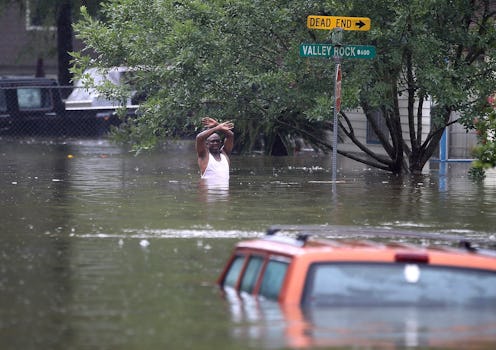News
Here's How Climate Change Impacted Hurricane Harvey

It would be a grave and insensitive understatement to say that Hurricane Harvey has fulfilled some of the worst predictions on the forecast. Since making landfall on Friday, the storm has completely flooded the Houston area, with reports confirming at least nine people dead in the aftermath, and the rainfall continues. Given the strength and impact of the storm, and the global ecological crisis the world's already facing, it's feasible to wonder what role climate change played in Hurricane Harvey.
It's hard to draw an immediate connection beyond the fact that Harvey is a natural disaster — and climate change affects the weather. However, when you really dig in, you can connect the dots.
For starters, climate change is exacerbated by the excessive release of greenhouse gases, such as carbon dioxide and methane. But how does that affect a tropical storm? Well, these gases prevent some of the sun's rays from dissipating into space, and as a result, raise temperatures across the globe. As temperatures across the globe rise, so does the heat of the sea level.
A report from Climate Signals reveals that last week the Atlantic Sea temperatures near the Gulf of Mexico were particularly hot: as much as 2.7 - 7.2°F (1.5 - 4°C) above average. The heat in the water creates more air vapor and thus contributes to increased rain, which in the case of Harvey, could have contributed to a full-blown destructive hurricane.
Kevin Trenberth, a senior scientist at the U.S. National Center for Atmospheric Research, told The Atlantic that he believes climate change made Hurricane Harvey a much stronger storm than it otherwise would have been.
"This is the main fuel for the storm,” Trenberth said, referencing climate change. “Although these storms occur naturally, the storm is apt to be more intense, maybe a bit bigger, longer-lasting, and with much heavier rainfalls —because of that ocean heat."
It should be noted that during this time of year oceans are normally warmer, and the correlation between hurricanes and global warming are more mixed than the connection between climate change and increased rain. Still, while Harvey would have likely formed without climate change, it's within reason to speculate it would not have grown as powerful.
J. Marshall Shepherd, director of the atmospheric sciences program at the University of Georgia, told The New York Times that Harvey's flooding could easily surpass that of other storms in North America's history. Particularly, since evidence increasingly suggests the ocean heat is causing more rain.
"You’ve just got this stream of moisture fire-hosing into the Houston region. This could go down as the worst flood disaster in U.S. history," said Shepherd.
While the jury is out on just how severe a role climate change played in this particular storm, it would be willfully ignorant to not consider the connections.